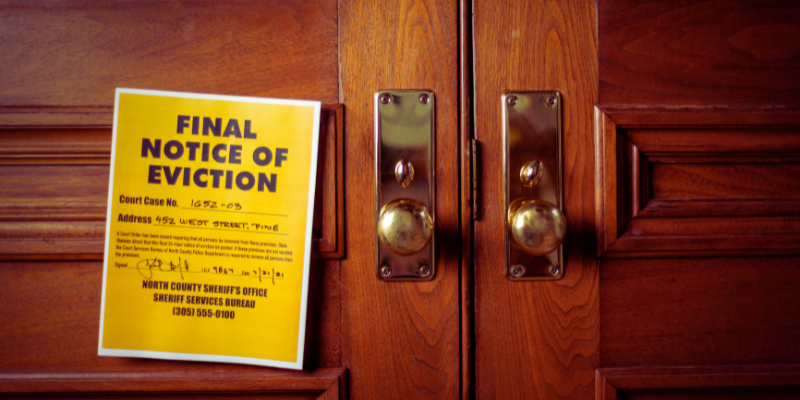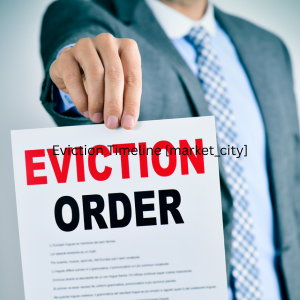
Understanding the Eviction Process in Raleigh, North Carolina: A Practical Guide for Landlords and Tenants
Going through an eviction whether you are a landlord trying to take back your property or a tenant facing removal — is never simple. In Raleigh, North Carolina, the eviction process follows a series of legal steps that must be followed precisely. Skipping a requirement or filling out paperwork incorrectly can cause delays or even force you to start the process all over again. That is why it is so important for both landlords and tenants to understand how the process works, how long it usually takes, and what rights and responsibilities each party has.
This guide shows you the entire eviction process in Raleigh, from the first notice to the final ruling. It also tells you what to expect at each stage.
Key Highlights
- Understanding North Carolina’s eviction process helps landlords and tenants protect themselves and avoid costly mistakes.
- Proper documentation is critical — from serving eviction notices to filing paperwork in court.
- Tenants have multiple chances to raise defenses or negotiate before a final judgment.
- Legal advice is strongly recommended, especially for first-time landlords or tenants navigating eviction.
- The entire process can take anywhere from a few weeks to several months, depending on appeals, delays, or court schedules.
Overview of the North Carolina Eviction Process
The official name for North Carolina’s eviction process is “summary ejectment.” It is a set of steps that landlords must follow in order to legally kick tenants out of a rental property. In this state, unlike some others, owners can’t just change the locks or leave things on the curb. To make sure everything is fair, renters are given notice, a chance to fix the problem, and a chance to defend themselves in court. Landlords need to know about each step to avoid delays that cost a lot of money, and renters need to know their rights and what they need to do.

Initial Steps in the Eviction Journey
An eviction almost always begins with a problem in the rental relationship. Maybe a tenant fell behind on rent, caused significant property damage, or violated key lease terms. No matter the reason, the landlord cannot skip directly to court. Instead, the first step is serving the tenant with a written notice.
The most common version of this notice is the “10-day demand for rent.” In this case, the landlord gives the tenant ten days to pay the overdue rent before further action is taken. For tenants on a month-to-month lease, a “30-day notice to quit” might be used to end the arrangement. If the tenant complies during the notice period, the eviction process stops there. If not, the landlord has the right to move forward with filing a lawsuit.
Documentation is extremely important during this stage. Landlords should keep copies of notices, mailing receipts, and any written communication with the tenant. These records later serve as proof in court that the process was followed correctly. For tenants, this window of time is often the best opportunity to negotiate. Many landlords are open to payment plans or other solutions that prevent the hassle of going to court.
Understanding North Carolina-Specific Eviction Laws
The rules in North Carolina about evicting people are meant to protect both property owners and tenants’ rights to housing. Laws tell landlords exactly what kinds of notices they need to give tenants, how long they need to give them, and how to deliver papers properly. If you use the wrong form or skip a step, the whole case could go wrong.
Landlords must also show that they have a valid reason to pursue eviction. Common grounds include nonpayment of rent, significant property damage, or other lease violations such as having unauthorized occupants or pets. Tenants, however, are not without defenses. They might argue that rent was paid within the notice period, that the landlord failed to keep the property habitable, or that the notice was not properly served.
It’s important to remember that all evictions must be handled through the court system. Lenders or landlords cannot simply remove tenants on their own. Legally, an eviction cannot move forward until a judge makes a ruling and the sheriff enforces it. While this process helps ensure fairness, it can also be lengthy and complicated. These protections highlight why it’s essential for both landlords and tenants to understand their rights and, when needed, seek qualified legal assistance. And if you’re looking for a quicker solution, we buy houses in North Carolina, helping property owners move forward without the stress of lengthy eviction proceedings.
Filing a Complaint for Summary Ejectment in Raleigh
If the tenant does not fix the problem during the notice period, the landlord’s next step is to file a complaint for summary ejectment in Wake County District Court or the district court where the property is located. This filing officially asks the court to review the case and decide whether the tenant should be removed.
To do this correctly, landlords must fill out Form AOC-CVM-201 and submit it with the appropriate filing fee. The complaint needs to clearly explain the reason for the eviction, whether it is unpaid rent, property damage, or another violation. It must also show that the tenant was properly given notice and that the landlord made reasonable efforts to resolve the issue.
Because accuracy is so important, many landlords choose to work with an attorney during this stage. Even a small mistake on the paperwork or missing evidence could cause the judge to dismiss the case, forcing the landlord to begin the process again. By seeking legal guidance, landlords can ensure the documents are properly prepared and the case progresses without unnecessary setbacks—an especially valuable step if you need to resolve issues quickly to move forward with options like deciding to sell your house fast in Raleigh.
Serving the Eviction Notice to the Tenant
The tenant must be given official notice of the case after the complaint is made. The tenant will know when and where the court meeting is because of this. There are a few different ways to deliver something in North Carolina, but the most popular ones are personal delivery and certified mail with a return receipt. Most of the time, the most reliable way to deliver a notice is to hand it straight to the tenant. Also, certified mail is strong because it leaves a paper record. Notifying the tenant by putting a notice on their door is sometimes the last option, but the renter can argue that they never got it in court.
Landlords should always keep records of how the notice was delivered. Signed receipts, photographs, or affidavits can serve as evidence later if the tenant disputes service. For tenants, ignoring a notice is one of the worst mistakes to make. Even if the situation feels unfair, showing up in court is always better than letting the case go forward uncontested.

Attending the Court Hearing in North Carolina
Once service is complete, the court schedules a hearing, usually within one to two weeks. Both landlord and tenant must attend, and both should come prepared. Landlords should bring the lease agreement, copies of notices, payment records, and any evidence of lease violations such as photographs or inspection reports. Tenants should gather proof of rent payments, records of communication about needed repairs, or other evidence that supports their defense.
During the hearing, the judge or magistrate listens to both sides and reviews the documents. Courtroom etiquette is important; addressing the judge respectfully and presenting information in an organized way can influence how the case is received. If the landlord proves their case and the tenant cannot provide a strong defense, the judgment usually favors the landlord. However, tenants may still have the right to file an appeal within ten days.
North Carolina Eviction Timeline: Regaining Possession
The full eviction timeline in Raleigh can vary, but it generally follows a predictable order. It begins with the notice period, which may last ten to thirty days depending on the situation. Filing and serving the complaint typically takes another one to two weeks. The court hearing usually happens within seven to ten days after the tenant has been served, and the judge issues a decision soon afterward.
If the landlord wins, the tenant has ten days to file an appeal. If no appeal is filed, the landlord can request a writ of possession, which authorizes the sheriff to carry out the eviction. The sheriff usually schedules the removal within a week or two. Altogether, the process may take as little as three to six weeks, though appeals or scheduling issues can extend it into several months.
Common Tenant Defenses
Tenants facing eviction in Raleigh do have options. Some of the most common defenses include proving that rent was paid within the notice period, showing that the landlord failed to maintain safe and habitable living conditions, or pointing out that the notice or service was not handled correctly. In some cases, tenants may argue that the eviction is an act of retaliation, such as after reporting code violations. These defenses do not guarantee that the eviction will be stopped, but they can buy valuable time or even persuade the court to rule in the tenant’s favor if the landlord has not complied with the law.

Why Legal Advice Matters
Whether you are a landlord or a tenant, the eviction process is stressful. Having an attorney involved can make a huge difference. Lawyers can review notices, ensure that filings are correct, and represent you during the hearing. They can also negotiate settlements, which often save both parties time and money. For tenants, free or low-cost assistance may be available through organizations like Legal Aid of North Carolina, especially for those with limited income.
Final Thoughts
Eviction in Raleigh is a process that requires patience, documentation, and strict attention to detail. For landlords, it is the only legal way to regain possession of their property, but it comes with obligations that must be followed carefully. For tenants, it can be a frightening experience, but understanding your rights and possible defenses gives you a better chance at a fair outcome.
At the end of the day, the eviction process is about maintaining balance. It serves to protect landlords from financial loss while also ensuring tenants have the opportunity to present their side. No matter which position you’re in, the smartest approach is to stay informed, stay organized, and seek legal guidance when needed. This helps keep the process fair, efficient, and protective of your rights from beginning to end.
If you’re facing housing challenges, remember that Wake County Home Buyers buys houses for cash in any situation—contact us today to learn more.
FAQs:
What is the initial step in the eviction process in North Carolina?
The eviction process begins with the landlord recognizing a breach in the rental agreement. This often involves nonpayment of rent or violations of lease terms. Before taking legal action, the landlord must serve the tenant with a written notice, such as a “notice to quit” or a “10-day demand for rent” notice.
What are common grounds for eviction in North Carolina?
Common grounds for eviction include nonpayment of rent, property damage, or violation of lease agreements. It is crucial for landlords to document these violations properly to support their case.
How can tenants defend themselves in an eviction process?
Tenants can present defenses against eviction claims by landlords. For instance, they might argue that rent was paid within the grace period or that the landlord failed to make necessary repairs, breaching the rental agreement. Tenants can also use evidence to support their cases.
What happens if a tenant does not comply with an eviction notice?
If a tenant fails to comply with the eviction notice within the given timeframe, the landlord can file a complaint for summary ejectment in the county’s district court to initiate a formal eviction process. This step is essential for regaining possession of the property legally.
What is the importance of proper documentation in the eviction process?
Proper documentation is key in both serving eviction notices and filing summary ejectment complaints. Keeping detailed records of communication, payments, and violations helps support the landlord’s case and ensures compliance with legal protocols, reducing the risk of delays or dismissals.
Helpful Raleigh Blog Articles
- Tenant Damage To Property in Raleigh, NC
- How To Successfully Sell Home With Title Issue in Raleigh, NC
- Fixing Up a House to Sell in Raleigh, NC
- Refinance a House After Divorce in Raleigh, NC
- Optimal Season For Selling Your Home In Raleigh, NC
- Selling A House To A Family Member in Raleigh, NC
- How Long Does An Eviction Process Take in Raleigh, NC
- Capital Gains Tax After Selling A House in Raleigh, NC
- How Much Does Home Staging Cost in Raleigh, NC
- Can You Sell a House As Is Without Inspection in Raleigh, NC
- How Much Equity Do I Need to Sell My House in Raleigh, NC

